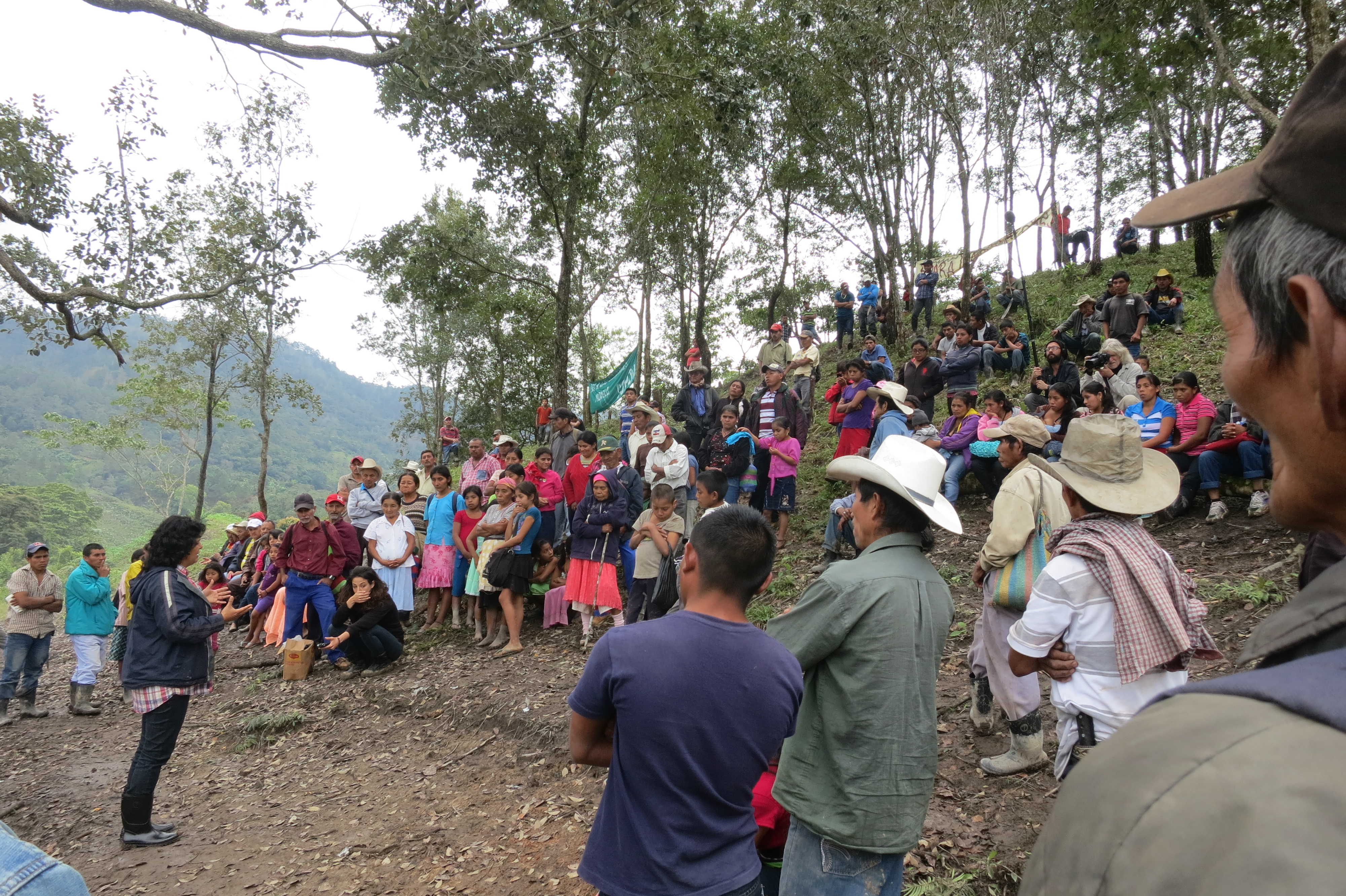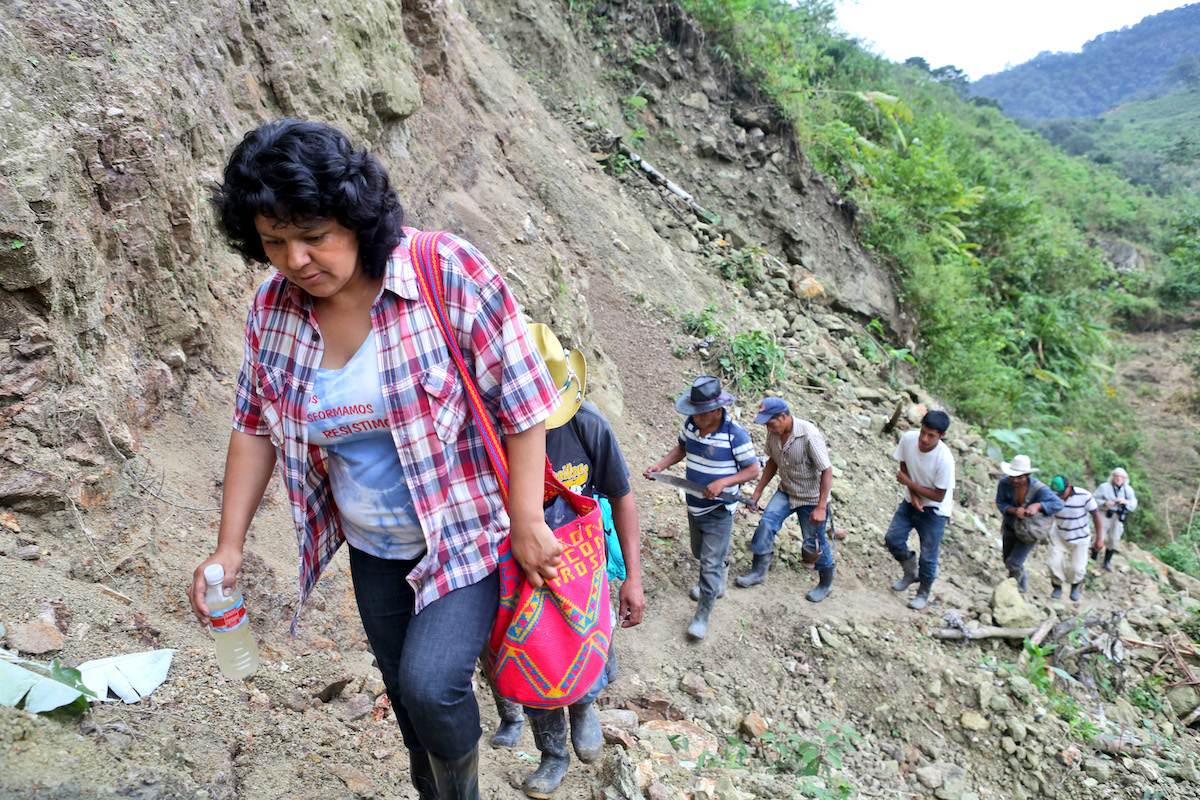(English Follows)
Han pasado 42 meses desde la desaparición de Berta Cáceres y no se ha hecho justicia. Hoy el Sierra Club le rinde homenaje a esta heroína Latinx.
Un año antes de su partida, la indígena lenca de honduras Berta Cáceres recibió el 2015 Goldman Environmental Prize por su ardua labor como activista ambiental, siendo la primordial defensora de los ríos del departamento de Intibucá, oponiéndose a la hidroeléctrica de Agua Zarca. Al recibir la condecoración, sus palabras fueron claras y llenas de sentimiento. “En nuestras cosmovisiones somos seres surgidos de la tierra, el agua y el maíz, de los ríos somos custodios ancestrales el pueblo lenca. Resguardados por los espíritus de las niñas que nos enseñan que dar la vida de múltiples formas por la defensa de los ríos es dar la vida por el bien de la humanidad y de este planeta”.
El gobierno de Honduras, debido a la demanda de energía barata en operaciones mineras, aprobó cientos de proyectos de represas en el país, privatizó ríos y tierras y entre ellos Agua Zarca, programada para construirse en el sagrado río Gualcarque. Como si las tierras fueran del gobierno, no le consultaron al pueblo indígena lenca, violando tratados internacionales que protegen sus derechos. Berta Cáceres creció durante la violencia de América Central en los años 80. Su madre, fue comadrona y activista social, y protegió a refugiados de El Salvador, por eso sus hijos conocen el valor de defender los derechos de las personas.
Cáceres se convirtió en activista y cofundó el Consejo Nacional de Organizaciones Populares e Indígenas de Honduras (COPINH) en 1993, con el fin de hacer algo ante las amenazas que enfrentan las comunidades lencas con respecto a la tala ilegal, los derechos territoriales y mejorar sus vidas. En el 2006, Cáceres, junto a un grupo que le pidió su ayuda, comenzó una campaña contra la represa de Agua Zarca. Ésta llegó a oídos de la comunidad internacional. La Comisión Interamericana de Derechos Humanos presentó apelaciones contra los financiadoras del proyecto.
Durante más de un año, Cáceres con los lencas organizaron un bloqueo pacífico para que DESA no pudiera pasar por la carretera a la represa. Según Amnistía Internacional, durante las protestas contra el proyecto hidroeléctrico de Agua Zarca, Berta Cáceres sufrió hostigamiento por las autoridades del gobierno hondureño. En el 2013, Cáceres fue detenida y acusada de portar arma sin licencia, cosa que ella desmintió diciendo que fue sembrada por los militares que la detuvieron. El mismo año, el ejército mató a otro de los líderes del COPINH, Tomás García; el hijo de García quedó mal herido.
Entre septiembre de 2013 y febrero de 2014, Honduras sentenció a Cáceres con prohibición de salida del país y firmando en el juzgado semanalmente.
Las amenazas de muerte a Berta Cáceres pararon el 3 de marzo de 2016, cuando hombres armados entraron a su casa en La Esperanza, Honduras, y la asesinaron. Doce días después, asesinaron a su colega y miembro del COPINH, Nelson García, provocando una indignación mundial, una sacudida. FinnFund y el banco de desarrollo irlandés FMO suspendieron su participación en Agua Zarca.
La familia de la activista ambiental Berta Cáceres recientemente apeló a una corte federal estadounidense para investigar al asesino de Cáceres por la supuesta compra de una lujosa propiedad en Texas por $1.4 millones, luego del asesinato. En el 2018 siete hombres fueron encontrados responsables del crimen orquestado por los ejecutivos de la represa Agua Zarca, Desarrollos Energéticos SA (DESA), pero los autores intelectuales no han sido imputados, no se ha hecho justicia. La comunidad ambientalista agradece a Berta Cáceres y a los demás activistas que han perdido sus vidas por el planeta y los derechos humanos.
¡Berta Cáceres, Presente!

Foto de Goldman Environmental Prize
Berta Cáceres, Defender of the Lenca
42 months have passed since the disappearance of Berta Cáceres and no justice has been done. Today the Sierra Club pays tribute to this Latinx hero.
A year before her disappearance, the Honduran Berta Cáceres received the 2015 Goldman Environmental Prize for her hard work as an environmental activist, being the primary defender of the rivers of the department of Intibucá and opposing the Agua Zarca hydroelectric dam. Upon receiving the award, her words were clear and full of feeling: “In our worldview we are beings born from the land, water and corn, from the rivers we are ancestral custodians of the Lenca people. Protected by the spirits of girls who teach us that to give life in multiple ways for the defense of rivers is to give life for the good of humanity and this planet. ”
The Honduran government, due to the demand for cheap energy in mining operations, approved hundreds of dam projects in the country and privatized rivers and lands. Among these projects was Agua Zarca, which was scheduled to be built on the sacred Gualcarque River. Acting as if the lands belonged to the government, they did not consult the Lenca Indigenous people, thereby violating international treaties that protect their rights. Berta Cáceres, also a Lenca, grew up during the violence of Central America in the 80s. Her mother was a midwife and social activist who protected refugees from El Salvador, so her children know the value of defending people's rights.
Cáceres became an activist and cofounded the National Council of Popular and Indigenous Organizations of Honduras (COPINH) in 1993, in order to do something for the threats facing Lenca communities regarding illegal logging, territorial rights and improving their lives. In 2006, Cáceres, together with a group that asked for her help, began a campaign against the Agua Zarca dam. This reached the ears of the international community, and the Inter-American Commission on Human Rights filed appeals against the project's funders.
In April 2013, Cáceres organized a roadblock to prevent energy company Desarrollos Energéticos S.A. (DESA) from accessing the dam site. For more than a year, Cáceres and the Lencas organized a heavy but peaceful blockade so that DESA could not pass the road to the dam. According to Amnesty International, during protests against the Agua Zarca hydroelectric project, Berta Cáceres suffered harassment by the Honduran government authorities. In 2013, Cáceres was arrested and accused of carrying a weapon without a license, which she denied saying it was planted by the military who arrested her. The same year, the army killed another of the leaders of COPINH, Tomás García, and seriously wounded his son.
Between September 2013 and February 2014, Honduras decided to immure Cáceres without going to jail but with a ban on leaving the country and a requirement to sign in to court weekly.
The death threats against Berta Cáceres stopped on March 3, 2016, when armed men entered her home in La Esperanza, Honduras, and murdered her. Twelve days later, her colleague and COPINH member, Nelson Garcia, was also murdered, adding to the worldwide outrage. FinnFund and the Irish development bank FMO suspended their participation in Agua Zarca.
The family of environmental activist Berta Cáceres recently appealed to a US federal court to investigate the murderer of Cáceres for the alleged purchase of a luxury property in Texas for $1.4 million, after the murder. In 2018, seven men were charged as being responsible for committing the crime at the direction of executives of DESA, but the instigators have not been charged, and no justice has been done. The environmental community thanks Berta Cáceres and the other activists who have lost their lives for the planet and human rights.
Berta Cáceres, Present!
